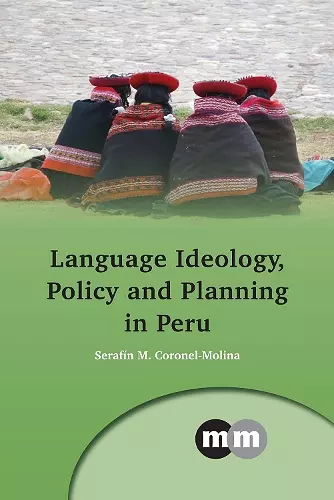Language Ideology, Policy and Planning in Peru
Serafín M Coronel-Molina author
Format:Hardback
Publisher:Channel View Publications Ltd
Published:14th Sep '15
Currently unavailable, and unfortunately no date known when it will be back

This book explores the role of language academies in preserving and revitalizing minority or endangered languages. The author studies the controversial High Academy of the Quechua Language (HAQL) in Peru, the efficacy of which has been questioned by some experts. The book delves into the positions, attitudes, ideologies and practices of the HAQL and the role it has played in language policy and planning in the Andean region. The author uses ethnographic fieldwork to support what was previously only anecdotal evidence from individuals viewing the Academy from the outside. This book would appeal to anyone studying the sociolinguistics of the Quechua language, as well as to those studying broader issues of Indigenous language policy and planning, maintenance and revitalization.
This book is a timely and welcome contribution to sociology of language studies. Focusing on Peru, the author explores the relationship between language academies, as ideologically charged institutions, and language policy and planning. His engaging ethnographic study of the inner workings of the Quechua Language Academy of Cuzco turns a spotlight on the complex historical, political and cultural underpinnings of language ideologies in the southern Andes.
-- Rosaleen Howard, Newcastle University, UKCoronel-Molina's insider perspective as Quechua speaker-teacher-scholar, his careful ethnographic work and penetrating analysis combine here for a unique in-depth look at Cuzco’s historic and sometimes controversial High Academy of the Quechua Language. Highlighting challenges and tensions in ideologies and practices of its founders, members, and programs to the present day, he offers valuable implications not just for Quechua standardization, revitalization and teaching, but for the corpus, status and acquisition planning work of language academies wherever they are found.
-- Nancy H. Hornberger, University of Pennsylvania, USAEngagingly written and meticulously researched, this rich, instructive ethnography takes readers directly into language planning and policy (LPP) as a complex and deeply ideological sociocultural process. Peeling back layers of history, linguistic practice, and power, Professor Coronel-Molina confronts directly the challenges inherent in status, corpus, and acquisition planning for a minoritized language. A major contribution to LPP research and practice, and to the field of applied linguistics.
-- Teresa L. McCarty, George F. Kneller Chair in Education and Anthropology, University of California, Los Angeles, USAThe author has created a comprehensive resource on language ideology, policy and planning in Peru that will serve as a model for how to carry out basic research on a language academy. This volume offers a substantive and critical assessment of HAQL, which merits consultation by any sociolinguist interested in carrying out research on the study of language academies and the appropriate procedures to follow in the maintenance and revitalization of endangered languages. Coronel-Molina has produced an outstanding resource for language planning, language policy, and practice.
-- Frank Nuessel, University of Louisville, USA * Language Problems and Language Planning 40:2 *With this research, Mr. Coronel-Molina seeks to provide enough information to help policy makers and educators work towards an efficient language policy planning for Andean governments. This study would be helpful in the development of corpus planning and acquisition planning, as well for the maintenance and revitalisation of the language he seeks to achieve.
-- Claudia Schuhbeck and Salvador Galindo Rogero * Training Language and Culture, Vol 1, Issue 2, May 20ISBN: 9781783094240
Dimensions: 234mm x 156mm x 22mm
Weight: 591g
304 pages